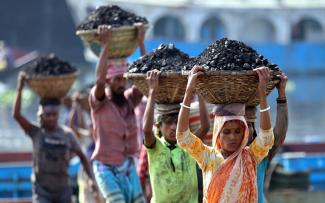Fossil fuel
Bangladesh’s coal boom

Thirteen of the planned plants are funded by Chinese state-owned and private companies, and five are under construction. All projects are associated with people losing their land and threats to biodiversity. One of the plants is being financed by the Chinese-dominated multilateral Asian Infrastructure Investment Bank (AIIB), which Germany is also a party to and which prides itself on being a “lean, clean and green” investor. Nonetheless, environmental requirements have been ignored, and so has compensation for land owners.
German companies are also involved in funding Bangladesh’s unsustainable coal development: the company Fichtner is the head engineering firm in the construction of a power plant in Rampal with a capacity of 1300 megawatts. This plant could permanently destroy the Sundarbans, the world’s largest mangrove forests. Mangroves, of course, are important carbon sinks.
At the same time, Bangladesh has an enormous potential for solar and wind capacity. By coordinating international, supranational and national actors, it could become one of the first countries to establish a decentralised, green energy system.











